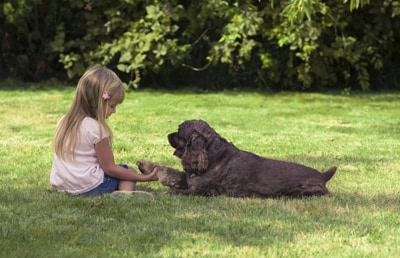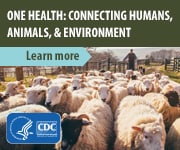Infants and Young Children

How to Keep Children Healthy Around Animals
Infants and children younger than 5 years old are more likely to get sick from germs that animals can carry. This is because young children often touch surfaces that may be contaminated with animal feces (poop), and they like to put their hands in their mouths. Objects like pacifiers may fall on dirty surfaces and then be placed in an infant’s mouth. Young children are less likely to wash their hands well.
Infants and young children are more likely to get a serious illness from germs that animals can carry because their immune systems are still developing. But there’s good news! You can take steps to keep your kids healthy while still enjoying animals!
Follow these steps to keep infants and young children healthy around animals
- Always supervise children around animals.
- Never allow children to kiss animals or to put their hands or other objects into their mouths after handling animals.
- Always wash children’s hands thoroughly with soap and water right after touching, feeding, or caring for animals or cleaning their habitats. Adults should supervise handwashing for young children.
- Wash your hands before breastfeeding or preparing formula.
- Keep children away from animals while they are eating to prevent the risk of bites or other injuries.

Because young children are more likely to get sick from harmful germs that animals can carry, CDC recommends that children under 5 years old avoid contact with the following animals:
- Reptiles (lizards, snakes, and turtles)
- Amphibians (frogs, toads, newts, and salamanders)
- Backyard poultry, including baby chicks or ducklings
- Rodents (rats, mice, hamsters, gerbils, and guinea pigs)
Additionally, children younger than 5 years old should be extra cautious when visiting farms and when they’re around areas with farm animals, including animals at petting zoos and fairs.
- Stay Healthy Around Animals Coloring Book pdf icon[PDF – 20 pages]
- Stay healthy around small pets!
- Stay healthy around pet reptiles and amphibians!
- Adopt these healthy pet habits
- Wash hands when leaving animal exhibitspdf icon[PDF – 1 page]
- 5 things to do RIGHT after visiting animals (print only)pdf icon[PDF – 1 page]
- Stay healthy around animals (print only)pdf icon[PDF – 1 page]
- Know how to be safe around animals!pdf icon[PDF – 1 page]
- Don’t Let the Dogs Bite: How to be Safe Around Dogs pdf icon[PDF – 20 pages]external icon – Coloring and Activity Book (California Department of Public Health)
- Compendium of Measures to Prevent Diseases Associated with Animals in Public Settingsexternal icon (National Association of State Public Health Veterinarians)
